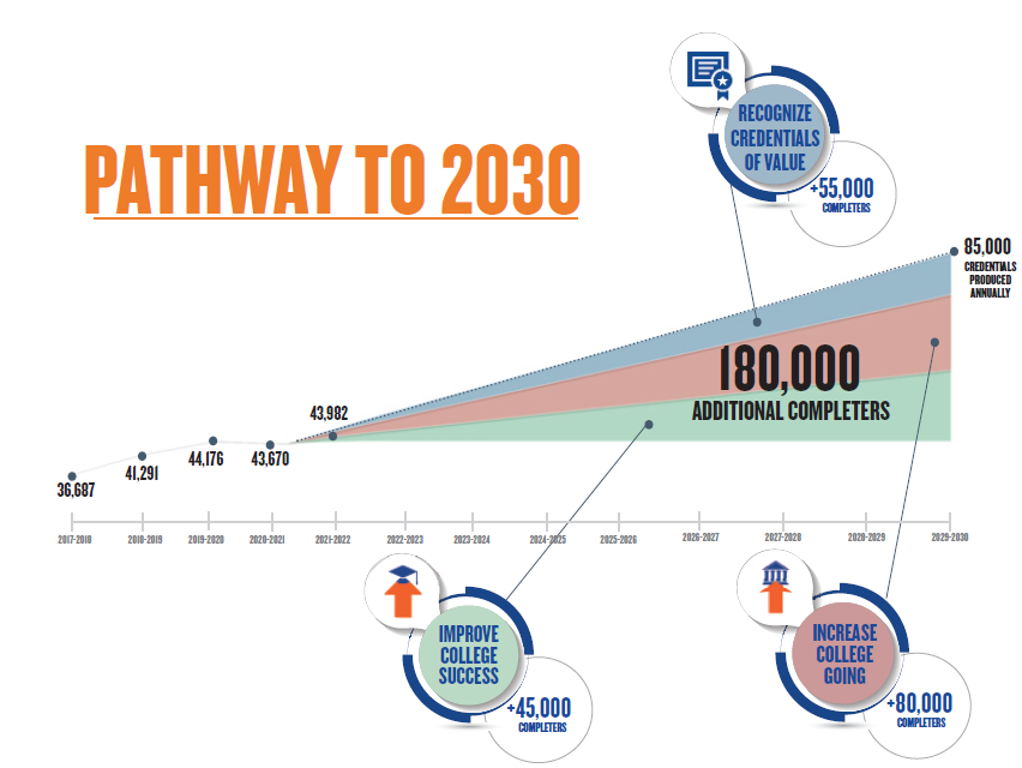BATON ROUGE, La. – Three years after adopting an audacious educational attainment goal for the state – 60% of Louisiana’s working adults holding a degree or credential of value by the year 2030 requiring the state to more than double the number of annual completers– the Board of Regents today issued their annual report on reaching the goal and outlined a clear pathway to achieve it. The report found a slight increase in college completers – up by 312 since last year – but the state has not rebounded from the pre-pandemic high of 44,176 completers in 2019.
Reaching an educational attainment level of 60% requires Louisiana to more than double its number of annual completers produced year after year, from approximately 40,000 in 2018 to 85,000 by 2030. Using rich data resources, Regents staff demonstrated a clear three-part formula to expand the production of postsecondary credentials for the state’s citizens, families, communities, and employers:
-
-
- Increase college going,
- Improve college success, and
- Recognize all credentials of value when calculating attainment rates
-
To reach the goal, the number of students expected to complete college using these combined approaches would need to increase by an additional 180,000 citizens over the course of the next eight years.

“Louisiana benefits from strong higher education leaders at the system and campus level, both public and private, standing shoulder-to-shoulder with our Governor, our legislature, our K-12 partners, and our stakeholders in embracing this work and moving it forward,” said Regents Chair Collis Temple III. “Following two years of major disruptions in our state, now is definitely the time to accelerate all pathways to prosperity, and I am pleased we have a roadmap.”
“Increasing educational attainment has never been more challenging or more necessary,” said Commissioner of Higher Education Kim Hunter Reed. “Our public and private higher education institutions remain committed to accelerating student learning, increasing affordability, and eliminating persistent achievement gaps. To realize a more prosperous tomorrow for our state and our people, this vision of stronger talent development must become a reality.”
Each of the three components of the Pathway to 2030 produces an estimated number of college completers, which in total will add 180,000 new college completers to Louisiana’s population. The list of strategies to be employed by higher education stakeholders includes:
INCREASE COLLEGE GOING (+80,000 Completers)
-
-
- Increase the number of students successfully starting college in high school through dual enrollment, AP, and IB.
- Expand the number of students who graduate high school with a postsecondary credential or build a solid foundation towards earning a degree from their college/university of choice through Fast Forward (earning an associate degree or apprenticeship in high school) and Louisiana Transfer Pathways.
- Grow the number of residents earning an industry-based certification through the M.J. Foster Promise program, which provides financial aid to adults
- Accelerate the number of near-completers who complete their degrees through programs such as Compete LA.
-
IMPROVE COLLEGE SUCCESS (+45,000 Completers)
-
-
- Establish the Meauxmentum Approach to improve student success and close equity gaps:
- Students make purposeful choice about their college goal during first year
- Strong student advising that sets a clear pathway to graduation, experiences that increase learners belief in themselves, meaningful connections to their field of interest, and reformed math and English courses that support their programs of study.
- Comprehensive student support incorporated both inside and outside the classroom
- Establish the Meauxmentum Approach to improve student success and close equity gaps:
-
RECOGNIZING ALL CREDENTIALS OF VALUE (+55,000 Completers)
-
-
- Count industry-based certifications, degrees, or diplomas awarded by Louisiana’s independent, private and proprietary institutions and build the technology and data sharing agreements necessary to do so.
-
Complementing the Pathway to 2030 approach, the Board of Regents also received updated academic plans developed as part of the newly-aligned education-to-employment approach for future academic degree development.
The new academic program planning model analyzes proposed campus degrees of interest against the workforce demands and gaps in every region of the state. This information will be used by Regents when considering an application to add or terminate a degree program at a public college or university. This level of planning allows campus leaders to both understand the specific core competencies needed in each of these fields of interest as well as whether a program proposal fills workforce gaps in their region or based on statewide needs.
“Moving from a transactional approach of individual program approvals to a data-driven, strategic model is far afield from what Louisiana has done in the past,” said Deputy Commissioner for Academic Affairs Tristan Denley. “This initiative is exciting because it allows Regents to collaborate with industry and postsecondary education partners to convene regional discussions around the expansion of targeted talent and economic development as we aim to increase overall prosperity.”
2019 Master Plan for Higher Education
#LaProspers
